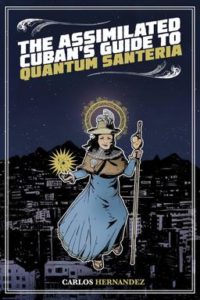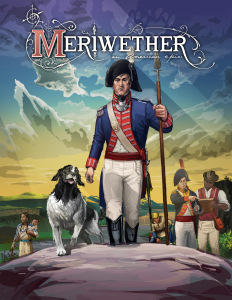 The best way to introduce Carlos Hernandez is to steal (with love, grace, and credit) from Haralambi Markov’s review of his short story collection over at Tor.com.
The best way to introduce Carlos Hernandez is to steal (with love, grace, and credit) from Haralambi Markov’s review of his short story collection over at Tor.com.
The Assimilated Cuban’s Guide to Quantum Santeria comes out of nowhere, blindsides you with its witty play on language, and steers you into a realm of delightful science fiction which blurs present and future with fingers steady on the pulse of modern culture as it is now. Carlos Hernandez, in this one collection, has managed to convince me he belongs in my heart as a favorite. He has shown me how to boldly contort structure in short fiction without taking any hostages and in the instances he succeeds, the payoff is significant and rewarding, leaving the reader a beast contented after a feast.
Or for something a little more official, Rosarium’s author’s bio: Carlos Hernandez is the author of over 30 works of fiction, poetry, prose and drama. By day, he is an Associate Professor at the City University of New York, where he teaches English courses at BMCC and is a member of the doctoral faculty at The CUNY Graduate Center. Carlos is also a game designer, currently serving as lead writer on Meriwether, a CRPG about the Lewis and Clark Expedition. He lives in Queens, which is most famous for not being Brooklyn.
If that does not convince you, then you are simply obdurate and I’ll have nothing further to do with you.
1. What do readers need to know about Carlos Hernandez?
I am constitutionally built for optimism. I like to make friends, laugh with strangers, invite people to play. I’m no Pollyanna, I promise! I have a pretty nihilistic worldview in the macroscope. But in the day-to-day, I am awash in people who want to do right, who show mercy and give generously, who try to do their duty even in the face of a merry-go-sorry life that redefines duty even as it’s being carried out. These are the people who deserve laughter and knotty thought experiments to ponder and VIP access into the magic circle that is another person’s imagination. I love to write for this audience.
More practically, I write, I teach college, I play games and I make them.
2. Can you remember the first story you read that made you think “I want to write!”?
I had a bilingual edition of Ferdinand the Bull when I was a wee Carlito. Read it until it became sweaty confetti in my hands. I now own a translation of that story—in Latin.
3. What was the inspiration for The Assimilated Cuban’s Guide to Quantum Santeria?
The collection is 12 stories! Each had its own inspiration!
- “The Aphotic Ghost”: Werewolves? Bah! Where are the were-jellyfish stories?
- “Homeostasis”: We already have zero idea whether anyone else exists. I will prove it once and for all. Also: faith feels nice.
- “Entanglements”: If the Many Worlds Theory is correct, there are an infinite number of yous who are better at life than you are.
- “The International Studbook of the Giant Panda”: There is literally a book in the world called The International Studbook of the Giant Panda that documents every known sexual encounter between pandas tagged and in captivity. Really, if you need any more inspiration than that, don’t be a writer.
- “The Macrobe Conservation Project”: No one’s going to believe this, but the direct inspiration for this story was Junot Díaz’s collection Drown. Yunior on a space station dealing with Dad.
- “Los Simpáticos”: a legend Mami told me about women using the hydrogen cyanide in tropical stone fruit to induce abortions led me to imagine a reality T.V. show in which people hire fake hitmen and then are interviewed by a reporter as to why.
- “More Than Pigs and Rosaries Can Give”: Conducting research into the Cuban Revolution disabused me of simplistic notions of The Left (though, full disclosure, I remain quite Left) and of politics in general. So I wrote a story in which a Cuban spiritualist sucks ghosts out of the bullet holes left in the walls where they were executed by firing squad.
- “Bone of My Bone”: Cuckolding is such bullshit: your partner cheats on you, and so you grow horns? Not on my watch.
- “The Magical Properties of Unicorn Ivory”: I hate how animals are slaughtered for ivory. I also don’t always think it’s wrong to lie to children.
- “American Moat”: The problem with patrolling the U.S./Mexico to keep aliens out of America is that some aliens have stuff you want. Like superpowers.
- “Fantaisie Impromptu #4 in C#min, Op. 66”: Catholics aren’t looking forward to The Singularity nearly as much as the rest of us. Here’s why.
- “The Assimilated Cuban’s Guide to Quantum Santeria”: What any Latinx can tell you: magical realism is actually realism. More or less creative nonfiction.
4. Which is your favourite Assimilated Cuban story and why? 
You can’t pick favorites among your children! Well, of course you can. You just don’t do it out loud.
What I’d say to readers is that:
- if you take your sarcasm black with lots of sugar, read “Los Simpáticos,” “Bone of My Bone,” and “American Moat.”
- if you like Big SF Ideas, you might enjoy “The Aphotic Ghost,” “Homeostasis,” “The Macrobe Conservation Project,” and “Entanglements.”
- if you want a more “novelly”-type reading experience, a lot of readers really seem to like my recurring narrator Gabby Reál, a reporter on the fringes of science and magic; the three stories that feature her are “The International Studbook of the Giant Panda,” “The Magical Properties of Unicorn Ivory,” and “Fantaisie Impromptu #4 in C#min, Op. 66.”
- if your tastes run more toward fantasy, magical realism, and questions of cultural ethnicity, try “More Than Pigs and Rosaries Can Give” and “The Assimilated Cuban’s Guide to Quantum Santeria.” (“Entanglements” also fits here.)
This is a mighty, mighty cop-out on my part. I am totally okay with that.
5. You get to invite five fictional characters to dinner ? who do you choose and why?
- Gargantua—because he suggests the very best way to wipe one’s butt is to use the neck of a goose. Can’t wait to see what he comes up with next.
- Oly Binewski (from Geek Love)—This book gave me the same “oh you can do this shit in literature?” epiphany that Gárcia Márquez had when reading Kafka, and Oly’s the narrator who payed out that revelation, metaphor by lightning-strike metaphor. I would love to say “thank you” in person and give her a hearty, soul-comforting stew to eat.
- Ivan Karamazov, because boy is he beautiful and boy is he broken. We’ll perhaps avoid the topic of religion. (I’ve limited myself to one choice from Brothers K. here, because I could imagine a separate party where it was just the whole cast from the novel. Would lock the liquor cabinet up tight, though.)
- The Wife of Bath—Feminist before it was cool! Hilarious, knows how to tell a story, and might be able to talk some sense into Ivan.
- The Pied Piper, as represented by C. S. E. Cooney in her Nebula-nominated novella “The Bone Swans of Amandale.” That story broke me. Beauty is terrible and hurtful and may I have another? That’s her Pied Piper in a sentence.
6. Who were/are your literary heroes/influences?
Going to stick to the mostly dead or apotheosized-whilst-alive here. And I’m guessing everyone tells you the same thing: “too many to mention!” etc.
That said: Dostoyevsky. Flannery O’Connor. Alice Munro. Piers Anthony (as a young man). Katherine Dunn (for one book, but what a book!). John Barth, Asimov, Gárcia Márquez, William Gibson, Laurence Sterne, Kathy Acker. Rabelais!!!
Oh God oh God. Too many to mention. Bradbury, Heinlein (yes, I know, but shut up), C.L. Moore (“Shambleau”!), metric tons of delicious Pulp, OCTAVIA BUTLER. Please, denizens of sky and underworld, let me once write something a third as artistically complete as Kindred.
Frankenstein. Wallace Stevens. The Satanic Verses. Who has ever written better sentences than Elizabeth Bishop? Raymond Carver, especially the stories in Cathedral.
Don Quixote is required reading! And as soon as you’re done, read Pedro Juan Guiterrez’s Dirty Havana Trilogy—a book more profound than profane, and holy shit is it profane—and you’ll understand my sense of humor completely.
Bless me, Ultima: please read this right now if you haven’t read it, and if you have read it, it’s been too long and you should reread it. Everyone should take a semester to study James Baldwin and another to study Toni Morrison. And Gogol. Minor in Gogol!
Too many. I have a Ph.D. in English mostly to have an excuse to read for six years. I love so many books. I am reading genre works these days mostly by living authors and can tell you I truly believe we’re living through an SFF Renaissance. Going to stop now.
Wait, not yet! Isabel Allende! Wang in Love and Bondage. Emily Dickinson. The Master and Margarita!
7. How did you link up with Rosarium Publishing?
Bill Campbell, Rosarium’s soul, asked me if I would contribute a story to the press’s anthology Mothership. Of course I would! And then he asked if I had a manuscript. I hadn’t been thinking about a collection of stories previously, but I can tell you truly, I had a pitch ready before I had finished reading that sentence he wrote me!
 8. Which book, either fictional or otherwise, would you say taught you the most about writing?
8. Which book, either fictional or otherwise, would you say taught you the most about writing?
The most honest answer I could give is “whatever the last book I read is,” because that is one fundamental reason writers read. But though true, I know that sounds glib. I’ve also expressed a lot of this answer above, so let me add something new to the interview by saying this: the unpublished, unindited book of Mami’s stories and Papi’s wrecking-ball décimas served as my introduction to the creation of an ontology via the medium of language. Actually, two languages, Spanish and English.
9. The future of the short story is …?
… shitty, in terms of payment; spectacular, in terms of quality of the work being published in SFF; meh, in terms of the so-called “literary” short story; meh again in terms of readership. One of the things that has always confused me about modern life is that people are busier than ever, and electronic formats are constantly reducing the number of words we get to read online. Yet it’s novels that sell. Why u no like short stories, readers? Dunno.
10. What’s next for Carlos Hernandez?
Two big projects:
- My novel, Planet Havana, imagines a world where the U.S. invades Cuba and finally restores it to its “destined” role as American playground for the rich or credit-worthy. The Cuban Communist hardliners that remain shoot what’s left of the Cuban Revolution up into space and invade an orbiting theme park, which they rename Planet Havana. This incenses the well-heeled paramilitary social club Granma Nueva (made up of Cubans who will never let go of their hatred of Communism) to clone Fidel Castro, but train the clone to be a neoliberal capitalist. It’s this clone-Castro’s mission to become Planet Havana’s new dictator and destroy the Cuban Revolution once and for all. On the fourth draft now, and maybe a few months more?
- The video game on which I’ve served as a designer and the lead writer—Meriwether—is going gold very very soon! It’s a 1st-Person CRPG where you play as Meriwether Lewis and try to guide the Lewis and Clark expedition across North America and back to St. Louis, making as many allies of the First People nations as you can and filling your journals with as many descriptions of the flora and fauna new to Western science as possible. Think Oregon Trail with A. Noire-style dialogue and historical rigor like you’ve probably never seen in a video game.

